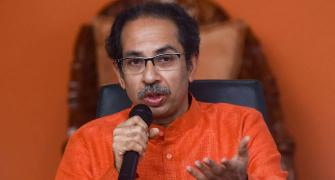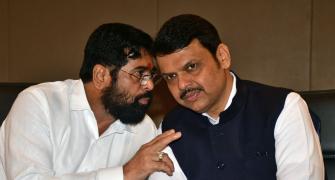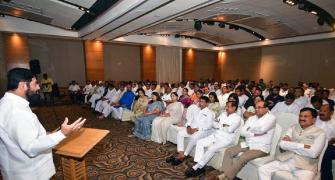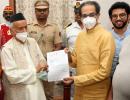'The Speaker has to act in an impartial way and in accordance with what the Supreme Court has laid out in its judgment.'

Constitutional expert and former secretary general of the Lok Sabha P D T Achary discusses the intricacies and nuances of the Supreme Court judgment delivered on May 11, 2023 to resolve the Shiv Sena versus Shiv Sena imbroglio.
Achary tells Prasanna D Zore/Rediff.com that the whole sum and substance of the apex court's judgment is centred around the premise that Speaker, being a Constitutional Office, will rule in an impartial manner when it decides upon the disqualification of the 16 MLAs who rebelled against the Uddhav Thackeray-led Shiv Sena in June 2022 and joined hands with the Bharatiya Janata Party to form the government.
Both the Shiv Sena-BJP and SS-UBT are using the Supreme Court judgment and observations to claim political and moral victory. How do you look at this judgment from the prism of legality and constitutionality?
The Supreme Court has said that the governor's action calling for the floor test (of the Uddhav Thackeray government to prove its majority) was wrong, not justified.
The governor had no objective material before him to do so. That was later proved irrelevant when Uddhav Thackeray resigned without taking the floor test.
The question now arises if it was proper for the governor to call Eknath Shinde, who was the member of the same Shiv Sena, whose chief minister had just resigned, to form the government.
It was answered in the affirmative when the Supreme Court said that the governor's action was justified in inviting Mr Shinde to form the government as he had the support of the BJP and had the required numbers to prove his majority.
But this needs to be clarified because that doesn't follow as a logical conclusion from the earlier description given by the Supreme Court about the action of the governor.
The governor, I think, was wrong in calling Mr Shinde to form the government because Mr Shinde was till then still part of the same Shiv Sena whose chief minister (Thackeray) had resigned.
Normally, under these circumstances, when a chief minister resignsm the governor looks for a leader from some other party in the legislative assembly and asks him if he could form a government. This is the normal, Constitutional, process.
The governor failed to act accordingly.
Instead, he chose to call Shinde, who was still the part of the same party (the undivided Shiv Sena). What made the governor call upon Shinde to form the government?
Now this point should have been dealt by the Supreme Court as per the logic of their first description of the action of the governor in calling for the floor test (The Suoreme Court in its conclusions said: 'The Governor was not justified in calling upon Mr Thackeray to prove his majority on the floor of the House because he did not have reasons based on objective material before him, to reach the conclusion that Mr Thackeray had lost the confidence of the House').
I see a little dichotomy in these two positions (taken by the Supreme Court).
So far as the appointment of the chief whip is concernedm the Supreme Court says that the chief whip can only be appointed by the original political party (the undivided Shiv Sena which existed before the split) and not by the legislature party (which Shinde headed after he got the support of 39 Shiv Sena MLAs).
This essentially means that the Speaker was wrong in recognising Shinde as the leader of the Shiv Sena, the appointment of chief whip (Bharat Gogawale) by Shinde's legislature party (which he headed) was wrong, which means that the whip (Sunil Prabhu) recognised by Uddhav Thackeray was legally valid.
Now, since the issue of disqualification of the 16 MLAs has been sent back to the Speaker (Rahul Narwekar), he will have to decide the issue based on the original whip issued by Uddhav Thackeray.
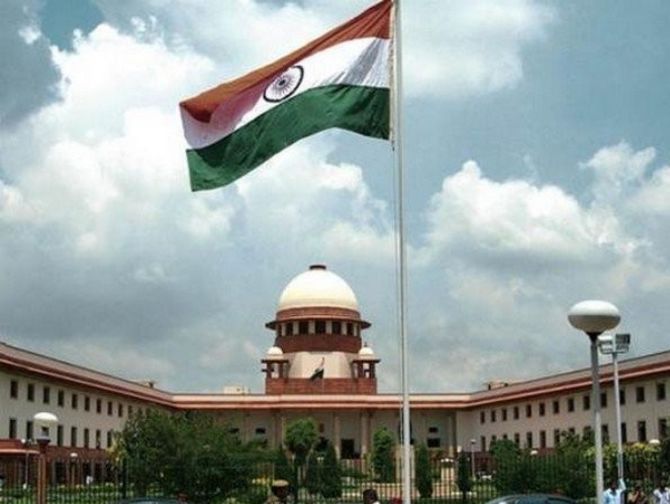
There's still some confusion on this point. In the light of the Supreme Court judgment the Shiv Sena-BJP are interpreting the Supreme Court order as allowing the Shiv Sena to appoint the whip and so there are reports of the Shiv Sena again appointing Bharat Gogawale as chief whip. How legally sound is that?
The basic point is who can issue the whip.
The Supreme Court has said in so many words that only the original party, that is, the political party (and not the legislature party) can issue the whip.
This issue has to be resolved in retrospect and not on the basis of what is happening today or what happened after Shinde's side issued a whip when they split from the Shiv Sena.
The anti-defection law itself makes it very clear. It says that the Speaker has to decide which party a member belongs on the basis of which party gave him the ticket to fight the elections.
It was the Uddhav Thackeray led undivided Shiv Sena which put up these candidates (the 40 MLAs, including Eknath Shinde who rebelled and formed the government with the BJP) to fight the elections under the banner of the Shiv Sena whose election symbol was the bow and arrow.
Does the Supreme Court judgment explicitly say so?
No. That is what I want to explain.
In its conclusion, point (d) the SC says: 'The political party, and not the legislature party, appoints the Whip and the Leader of the party in the House. Further, the direction to vote in a particular manner or to abstain from voting is issued by the political party and not the legislature party.'
'The decision of the Speaker as communicated by the Deputy Secretary to the Maharashtra Legislative Assembly dated 3 July 2022 is contrary to law. The Speaker shall recognise the Whip and the Leader who are duly authorised by the Shiv Sena political party with reference to the provisions of the party Constitution, after conducting an enquiry in this regard and in keeping with the principles discussed in this judgment.'
What principles is the court pointing to here?
The principle laid down in the judgment is that only the political party can appoint the whip, not the legislative wing of the party (which then had the support of the 40 MLAs who rebelled against Uddhav Thackeray).
It is only the political party that can appoint the leader (of the legislative wing). These are the principles laid out in this judement.
The Supreme Court is asking the Speaker to resolve the issue (of disqualification of 16 MLAs) on the basis of these principles laid down in the judgment.
How will the wheel then turn in the coming days?
I am sure there will be confusion. Both parties will claim victories (by reading the judgment selectively).
According to me the issue is settled as it was Uddhav Thackeray (Shiv Sena) who had the legal capacity to appoint the chief whip and also appoint the leader (of the legislative wing of the undivided Shiv Sena).
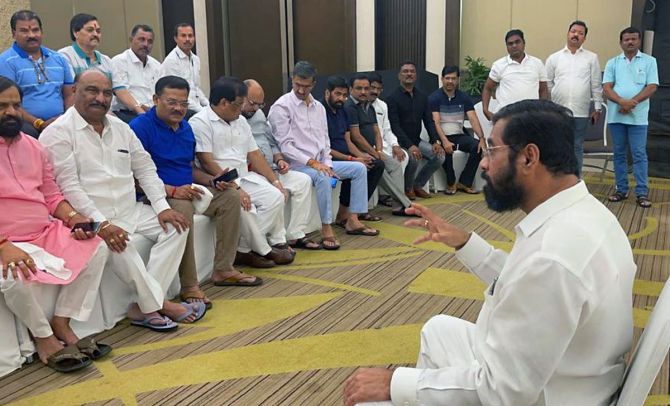
The Supreme Court's judgment also calls upon the Speaker to decide the disqualification petition within a reasonable period.
What could legally constitute a 'reasonable period'? Is there any framework/guideline that will help at objective definition of 'reasonable period'?
I think the Speaker should decide the issue within three months as Justice Rohinton Fali Nariman in one of his judgments had defined the reasonable period and it should be defined in the context of this judgment.
Whichever way the Speaker rules and whenever he does depending on what constitutes a 'reasonable period', what do you think the Speaker's options are?
There are no two ways other than the Speaker of the House deciding the disqualification (of MLAs) in the first instance.
It can come before the Supreme Court in case someone appeals against the Speaker's decision. That is why the Supreme Court referred it to the Speaker.
The Supreme Court has certainly laid the principles based on which the Speaker will give his ruling. And that is what the Supreme Court has done.
The Speaker does not have many options. According to me, the Speaker has only one option --that is to disqualify the MLAs who defied the whip issued by the undivided Shiv Sena led by Uddhav Thackeray.
If you understood this judgement correctly then the Speaker does not have any other option.
Would a Speaker elected by the support of the very same MLAs from the Shiv Sena and BJP disqualify them in the first place?
The Speaker is supposed to be above politics even if he is elected by the elected members in the legislative assembly. He has to be an impartial umpire and so the Supreme Court has invested so much confidence in the office of the Speaker.
If the ruling dispensation is behaving as if the Speaker will favour them just because they elected him then that goes against the spirit of the Constitutionality of the office of Speaker.
The Speaker has to act in an impartial way and in accordance with what the Supreme Court has laid out in its judgement.
That is the whole sum and substance of the judgment delivered by the apex court.
The only option before the Speaker now is to disqualify the MLAs who defied the first whip issued by the original, undivided, Shiv Sena.

